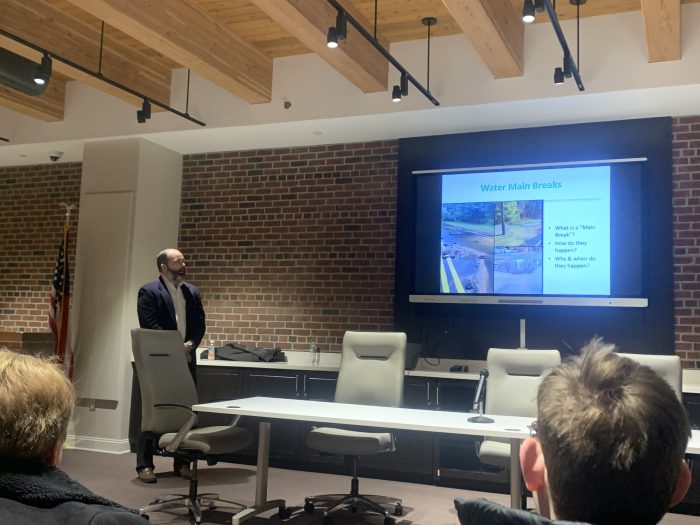By Sabrina Artusa
On Feb. 3, the Suffolk County Water Authority delivered a presentation to the Three Village Civic Association, addressing water quality concerns and water main breaks.
SCWA Director of Water Quality and Lab Services Thomas Schneider said that the SCWA tests for more than double the number of compounds than required by the Environmental Protection Agency and endeavors to keep levels of these contaminants well under the maximum amount deemed safe.
To filter the water, the SCWA integrates varying types of filtration systems depending on what contaminants are issues in that specific area. Commonly, the SCWA simply needs to add chlorine or adjust the ph level, but in other areas they filter with granulated activated carbon.
“[At] each of the pump stations or well fields, the treatment at those is specific to what the water quality is at that particular well…its very distributed architecture rather than, as we referenced, in New York City where it all flows through one main source.”
With contaminants that are especially difficult to extricate additional treatment is required. One such contaminant is 1,4-dioxane.
Schneider said,”1,4-dioxane is a manmade chemical. It is used as a stabilizer in solvents and it is also found in a lot of consumer products, specifically laundry detergents, shampoos, and conditioners…this one is very difficult and expensive to remove.”
In order to remove this contaminate the SCWA uses advanced oxidation procedure systems that use ultraviolet light to break down the 1,4-dioxane. Schneider added that the water authority has put in 16 of these systems so far, mostly in western Suffolk.
In 2023, SCWA added two advanced oxidation procedure treatments in Northport, three in Halesite, one in Huntington Station, one in Kings Park and one in Huntington.
According to the SCWA’s water quality reports from 2024, leeching from septic tanks and runoff from fertilizers, and pesticides were common likely sources of inorganic compounds.
In 2024, the SCWA added a new well and a GAC system at Stem Lane and Oxhead Lane.
“Any disruption in the continuity of water mains or sometimes it could be a surface line. So it could be anything from a small break in the water main or a larger blowout of the water main. Sometimes it is a small trickle bubbling up from the ground,” said Director of Construction/Maintenance Brendan Warner.
Water main breaks are caused by age or from outdated materials. Since Dec. 1 SCWA has already recorded 300 water main breaks, the second most in the last 10 years during this time. The average for the whole year is 500 breaks. Weather circumstances also play a factor in causing a main break; the freezing and thawing of soil and rapid temperature changes put stress on the pipes. The majority of the water main breaks happen to pipes made out of cast-iron, which are over half of the mains in the county.
John Marafino, customer growth coordinator, urged civic members to reexamine their water use, get their irrigation systems checked and enact habits that limit water use, both helping conserve water and decreasing the water bill.
“We have a sufficient but not limitless supply of water,” he said. “Watering everyday is not necessary to keep a green and healthy lawn.”






